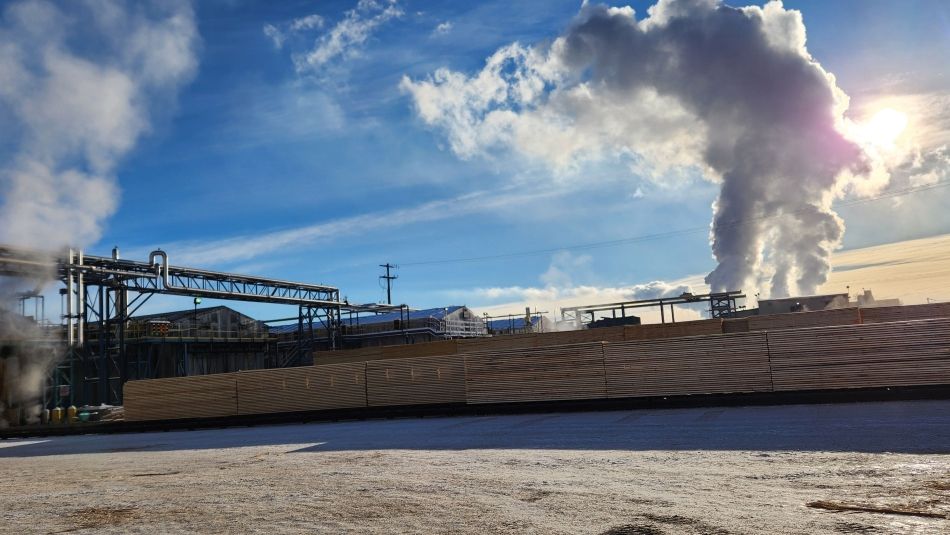
Share
After years of decline, it’s time for a united effort to help workers and communities.
By Gavin McGarrigle, Scott Lunny and Kelly Johnson published in The Tyee
Gavin McGarrigle is Unifor’s western regional director, Scott Lunny is director of United Steelworkers District 3 (Western Canada), and Kelly Johnson is national president of the union of Public and Private Workers of Canada.
British Columbia's forests, an emblem of both natural beauty and economic vitality, have supported communities and families for generations.
This economic powerhouse did not develop by accident — good forestry jobs today are the result of many decades of union organizing, strike action and labour struggles. The success of the B.C. forestry sector in the past also hinged on legislative and political leadership from government restricting raw log exports, requiring manufacturing and ensuring B.C. forests benefit B.C. workers and communities.
In recent years, this sector has faced a "perfect storm" of challenges, leading to a significant decline in employment and economic contribution.
As we navigate these turbulent waters, it is imperative that both the federal and provincial governments take decisive action to protect good forestry jobs and ensure a sustainable future for this critical industry.
The decline in B.C.'s forestry sector is not just a statistic; it is a crisis that affects real people and communities. Since 2001, the industry has seen a staggering 45 per cent drop in employment, translating to lost livelihoods for nearly 35,000 workers. Last year alone, the forestry sector saw the loss of 3,750 jobs.
This hemorrhage of employment is a devastating blow to regions where forestry has been the lifeblood of the community. The fallout from these job losses extends beyond individuals to the very fabric of our provincial economy and identity.
The roots of this crisis are varied. Environmental disasters exacerbated by climate change, such as forest fires and the mountain pine beetle infestation, have severely impacted available resources. Meanwhile, ongoing trade disputes and global market shifts have added layers of uncertainty. Last summer's record-breaking forest fires further strained an already struggling industry, highlighting the urgent need for a cohesive strategy that addresses both immediate and long-term challenges.
The solution to this crisis requires a multi-faceted approach, focusing on the protection and creation of unionized jobs, sustainable forest management, increased autonomy for Indigenous communities and innovation in value-added products.
We acknowledge that some work has started under the current government, and we continue to provide advice on the forestry crisis, including through the province’s Forestry Worker Supports and Community Resiliency Council.
We have insisted the programs be designed to ease workers’ transition out of the industry, but unfortunately they do not currently create a path toward a future forest industry with good, unionized jobs providing strong pensions and benefits.
Public funding needs to generate value for communities, not private shareholders. Funding for existing industries and new startups should flow with strict conditions for job creation, union coverage and apprentice ratios, and include strict targets for equitable participation under community benefit agreements, or CBAs. The NDP government has already mandated CBAs for new large-scale projects, such as the Broadway subway line, the new Pattullo Bridge and Trans-Canada Highway upgrades. We recommend that new forestry initiatives operate under similar agreements.
The government cannot simply hope that public funding will generate jobs and resilient communities; it must explicitly plan for it.
Moreover, the industry needs to innovate, exploring new markets and products that respond to the evolving demands of a global economy while maintaining high-quality, unionized employment.
The challenges facing B.C.'s forestry sector are indeed daunting, but they are not insurmountable.
With decisive action and leadership from both federal and provincial governments, we can protect existing jobs, create new opportunities and ensure the forestry sector remains a pillar of B.C.'s economy. This requires a commitment to negotiation and partnership with unions, government, Indigenous communities and industry stakeholders to develop strategies that prioritize workers, sustainability and innovation.
On Tuesday, forestry workers from the three unions representing unionized forestry workers in B.C. — Unifor, the United Steelworkers and the Public and Private Workers of Canada — will gather in Victoria to discuss the challenges the industry is facing and work together to develop a strategic plan for the future of their sector.
The forestry workers’ summit will be an unprecedented opportunity for workers to present a united front in the name of a rejuvenated industry.
As we look to the future, let us remember the foundational role of forestry in B.C.'s history and economy. The path forward must be one that honours this legacy through a commitment to sustainable practices, Indigenous partnerships, innovation and the well-being of the workers and communities who have built this industry.
The time for action is now; the future of B.C.'s forestry sector, and the communities it supports, cannot wait.


